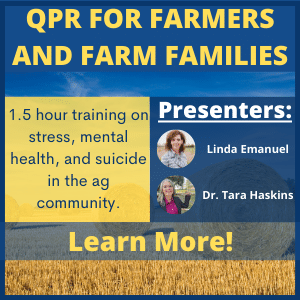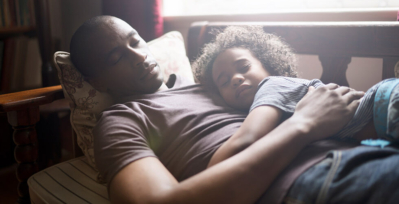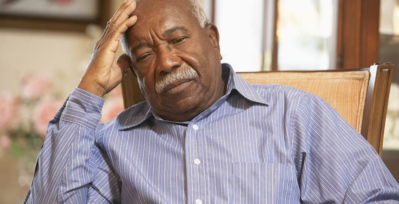Last updated on July 24th, 2024 at 09:08 am
Sleep Resources
Grogginess, body aches and fatigue, confusion, decreased productivity, and irritability are indicators that your sleep schedule needs some attention. In 1910, individuals slept 9 hours a night. Today, surveys indicate adults sleep less than 7 hours a night. According to the US Center for Disease Control and Prevention, sleep deficiency is now identified as a public health problem. GPS technology, LED lighting, equipment design and function, global food demands, markets, weather events, and family dynamics push producers to work past the physical and mental limitations of the body. To keep up, farmers and ranchers cut back on sleep.
Sleep deprivation causes a pendulum swing of disproportionate emotions from irritable and antsy, to giddy, to a state of vicious negativity. Negative feelings of worthlessness, sadness, depression and questioning one’s sense of value can be a part of that imbalance. Underslept adults are more apt to be self-absorbed in problems or themselves leading to faulty decision making and possibly more risk-taking behaviors. Fatigue causes the brain’s executive functions (which control cognitive, behavioral, and emotional skills)” are significantly impacted in a way similar to that of alcohol consumption. Dr. Matthew Walker, neuroscience and psychology professor at UC Berkley, found that 21 hours without sleep has the same side effects as a .08 blood alcohol level. In many states, this equates to being legally drunk.
During wakeful hours, our brain is constantly acquiring and absorbing new information. We learn and store the intentional and the unintentional information. Sleeping allows us to save the stored information, freeing up space for new information storage when we wake up. Sleeping also allows us to have “memory creativity,” where our brains test out and fuse separate sets of knowledge, which later helps us with our problem-solving skills.
Sleep gives our body and immune system strength to protect and fight against infections and sickness. During the day, our immune system is running constantly, and sleeping allows it to recharge. This is why we want to curl up in bed and sleep when we are sick.
Stamina, muscle strength, and balance are all improved by sleep. Proper muscle functioning requires a rested brain. The demands of farm and ranch work often uses many muscles, so it is important to have adequate sleep to prevent injuries and accidents.
Average healthy adults require eight to eight and one-half hours of sleep a night. Sleep needs and patterns change Healthy adults require 8-9 hours of sleep each night. As we age, our sleep patterns and needs change. Older adults tend to wake early and sleep early. Overall, having good sleep practices and a healthy lifestyle promote your best work performance. Make sure to keep sleep as a part of your workplace wellness plan.
Sleep Resources
Fact Sheets
| ID | Title | Summary | Link |
|---|---|---|---|
| 10569 | Consejos y trucos para dormir mejor | 30 tips in Spanish for getting better sleep at night. English Title: Tips and Tricks for Better Sleep | |
| 13674 | Sleep and Your Health | episode of Talking Total Farmer Health | |
| 8935 | Tips and Tricks for Better Sleep | 30 tips for getting better sleep at night. Spanish Title: Consejos y trucos para dormir mejor | |
| 12735 | Ways to Stay Safe During Harvest | Article in Farm Progress by Curt Arens |
Webinars
| Webinar Title | Summary | Link |
|---|---|---|
| Sleepless in America | The U.S. Center for Disease Control and Prevention now identifies sleep deficiency as a public health problem. Sleep affects every moment of our daily lives, from how we think and remember to how our bodies thrive or deteriorate. It determines how we deal with stress, make choices related to safety, and function as human beings. While most health education tends to focus on nutrition and activity, sleep is arguably the single most important factor in maintaining a healthy lifestyle, and lack of it causes a significantly reduced quality of life. This presenter proposes that we prioritize sleep and improve daily sleep hygiene to enhance every facet of our well-being. |
Page updated: July 2021




